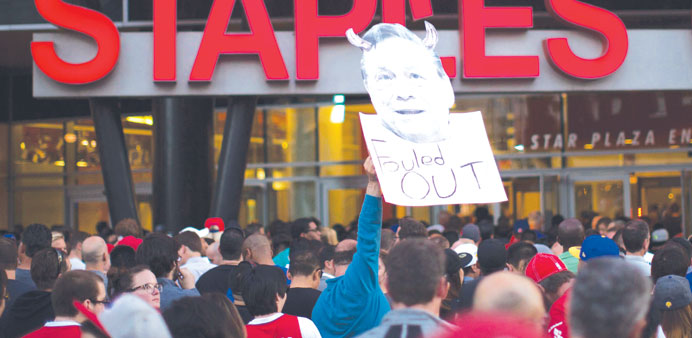A cutout of LA Clippers owner Donald Sterling is seen among people standing in line for the NBA game between Golden State Warriors and Los Angeles Clippers. (Reuters)
Reuters/Los Angeles
Now that the NBA has banned Los Angeles Clippers owner Donald Sterling from pro basketball for life over racist comments the league says he acknowledged making, it’s up to fellow team owners to back an unprecedented move to force a sale of his franchise.
Left uncertain, however, is whether the other owners will take that step. Some experts said Sterling’s peers might be leery of action they felt could jeopardize their own property rights in the future. Also unclear is whether Sterling will fight the ban in the court.
Sterling was forced out on Tuesday after two websites released audio recordings over the weekend of a voice said to be his, criticizing a woman friend for “associating with black people.” In it, he asks her not to invite former Los Angeles Lakers star Earvin “Magic” Johnson to Clippers games.
News of the recordings drew outrage from players, fans, politicians and commercial sponsors, several of whom said they were cutting ties with the team, even after the NBA moved to expel Sterling.
The scandal quickly grew into a national discussion of race relations transcending basketball. On Tuesday, it led National Basketball Commissioner Adam Silver to prohibit Sterling from any ties with the Clippers organization or the league as a whole and bar him from ever again attending NBA games or practices.
Sterling, the longest-tenured of the NBA’s 30 owners, also is excluded from any team business or player personnel decisions and has been stripped of his seat on the league’s board of governors, Silver told a news conference in New York City.
Moreover, the league fined Sterling $2.5 million, its maximum monetary penalty, and the commissioner called on the league’s governing board of fellow owners to act immediately to force Sterling to sell the club he bought 33 years ago.
Such a move, requiring a vote by three-fourths of Sterling’s peers, would mark the strongest such rebuke of an NBA owner in league history and is almost unheard of in US pro sports.
Asked whether Sterling, 80, could end up an absentee owner, Silver told reporters, “I fully expect to get the support I need from the other NBA owners to remove him.”
‘JUDGE AND EXECUTIONER’
Sterling could not be reached for comment on Tuesday, and it was not immediately clear whether he would seek to challenge the ban in court.
But lawyers with expertise in sports law gave him little chance of successfully suing the NBA, citing league governance rules that all owners must accept.
“Having agreed to the NBA constitution and bylaws, I think courts will generally make him adhere to the agreement that he freely entered into,” said Jeffrey Kessler, a lawyer who serves as outside council to the NBA Players Association.
Nathaniel Grow, a University of Georgia professor of sports law, agreed, saying the NBA commissioner is “almost like a judge and executioner, and whatever he says goes.”
If Sterling’s peers vote him out, he could sue them under antitrust laws, but that would be an uphill climb, too, said Boston University sports law professor Michael Harper.
The prospect of forcing Sterling to sell his team set off speculation about potential buyers.
Billionaire media executive David Geffen is interested in acquiring the Clippers, a person who had been informed of his thinking told Reuters after Tuesday’s announcement, though a previous expression of interest never produced an offer.

